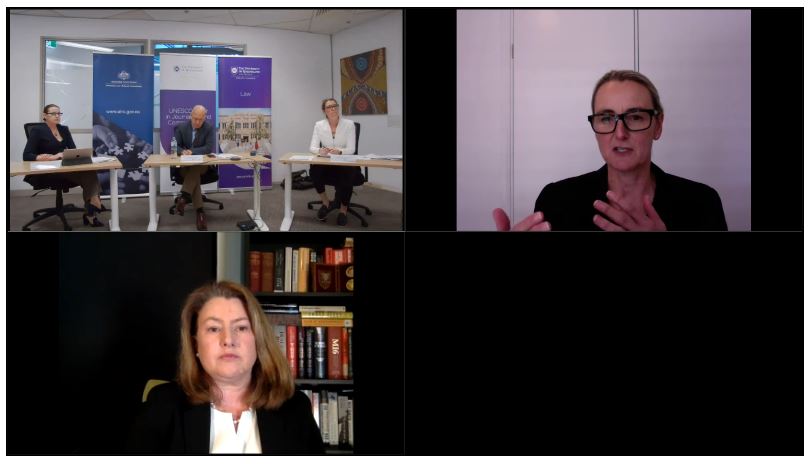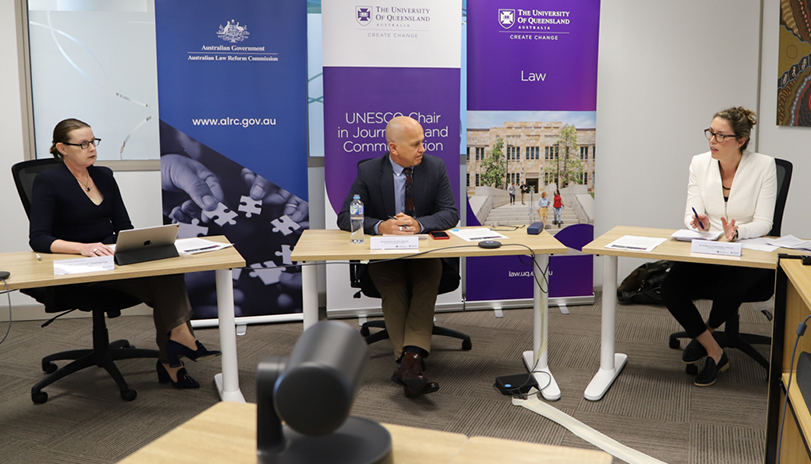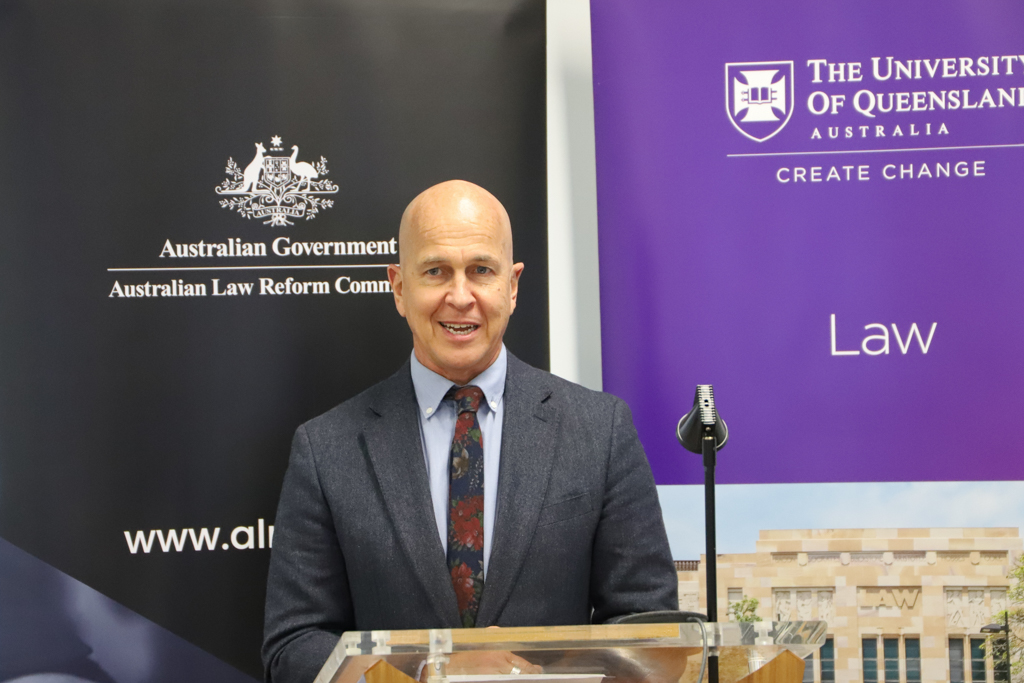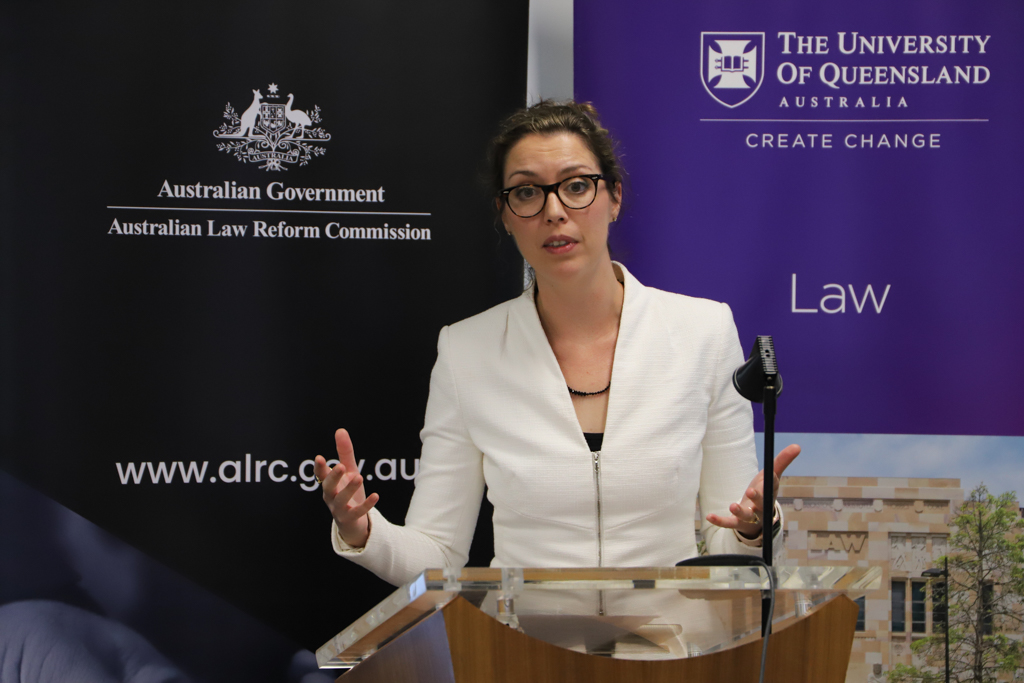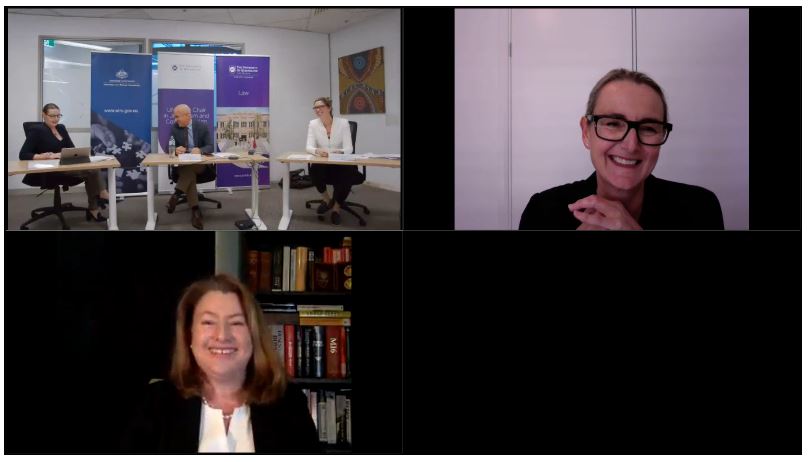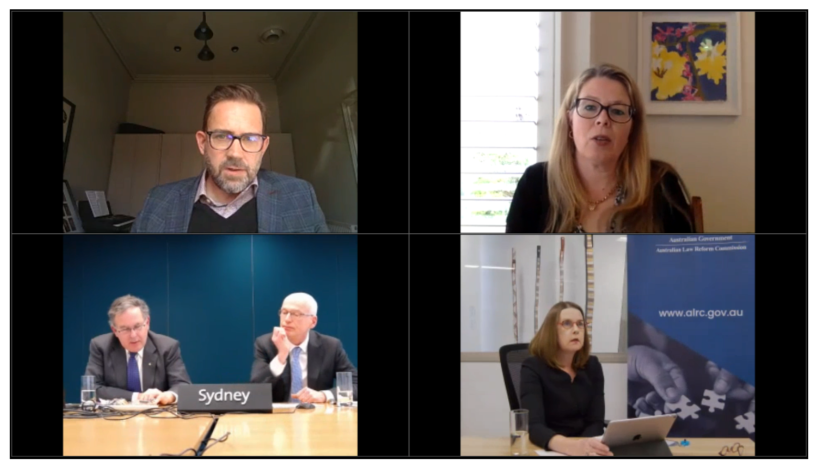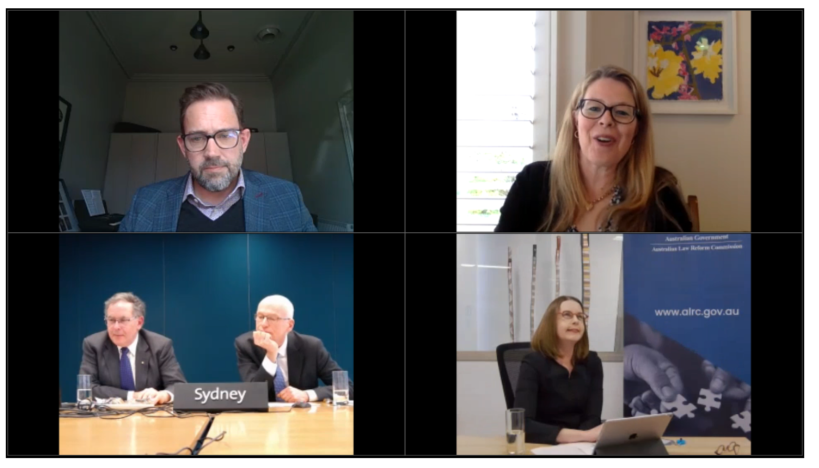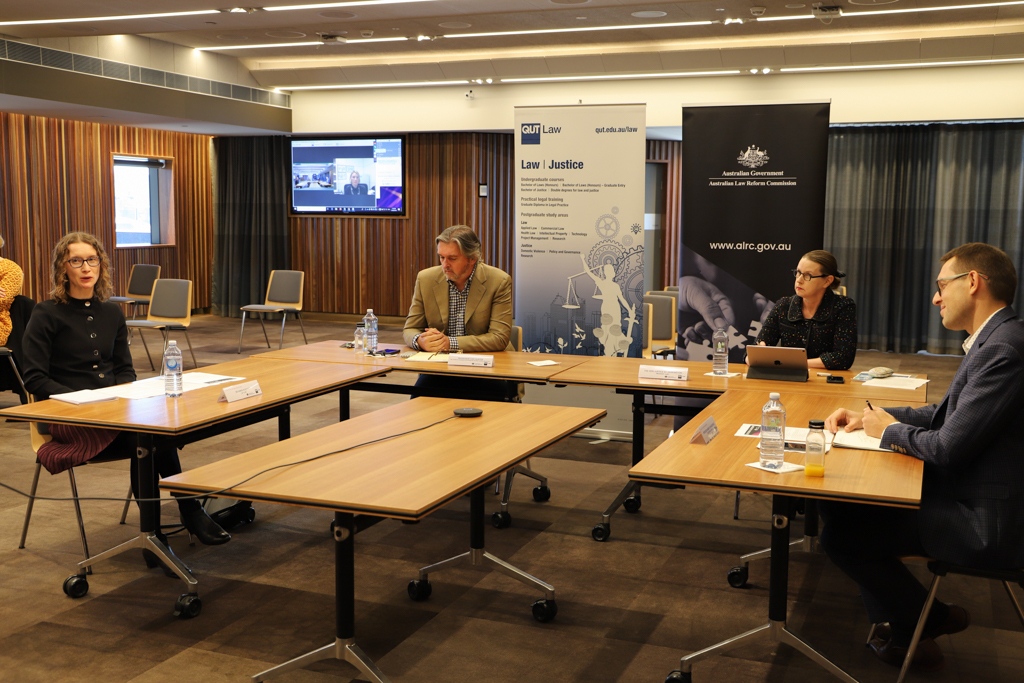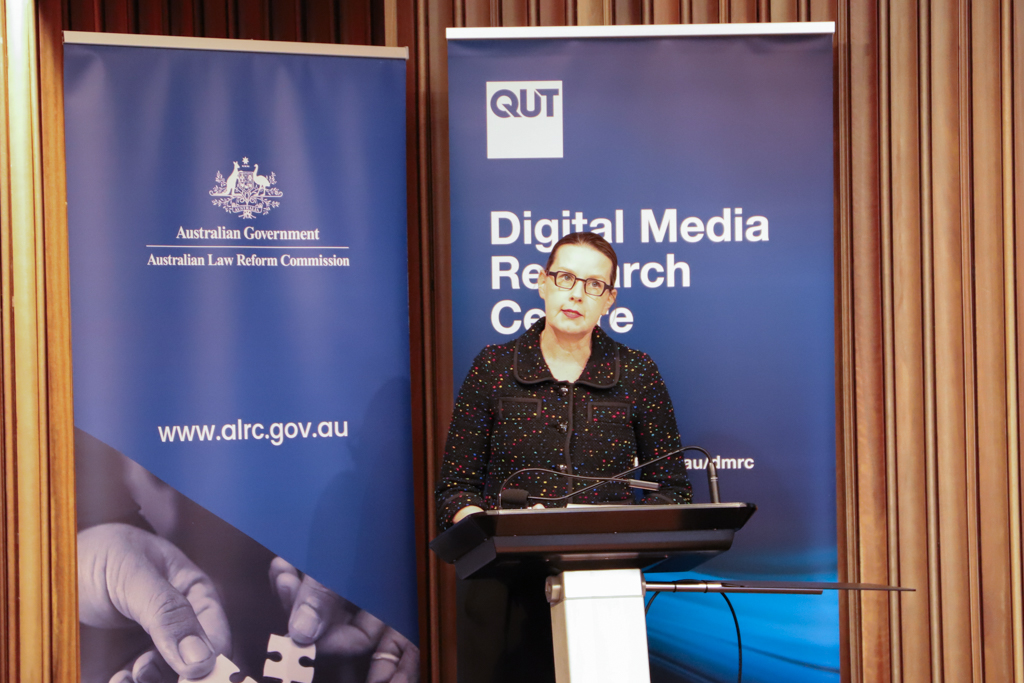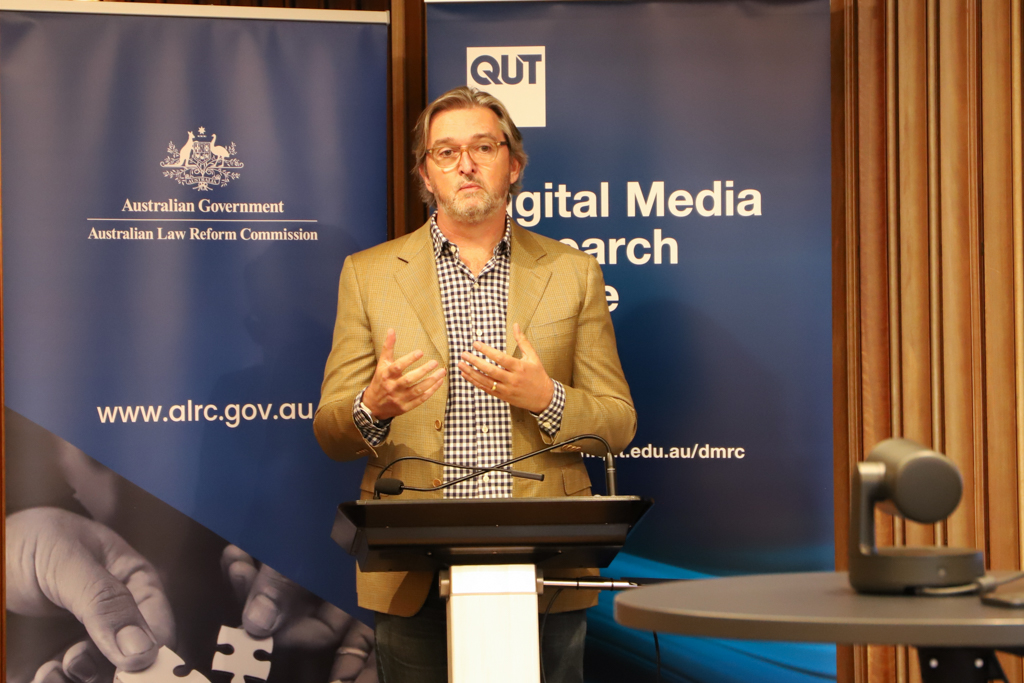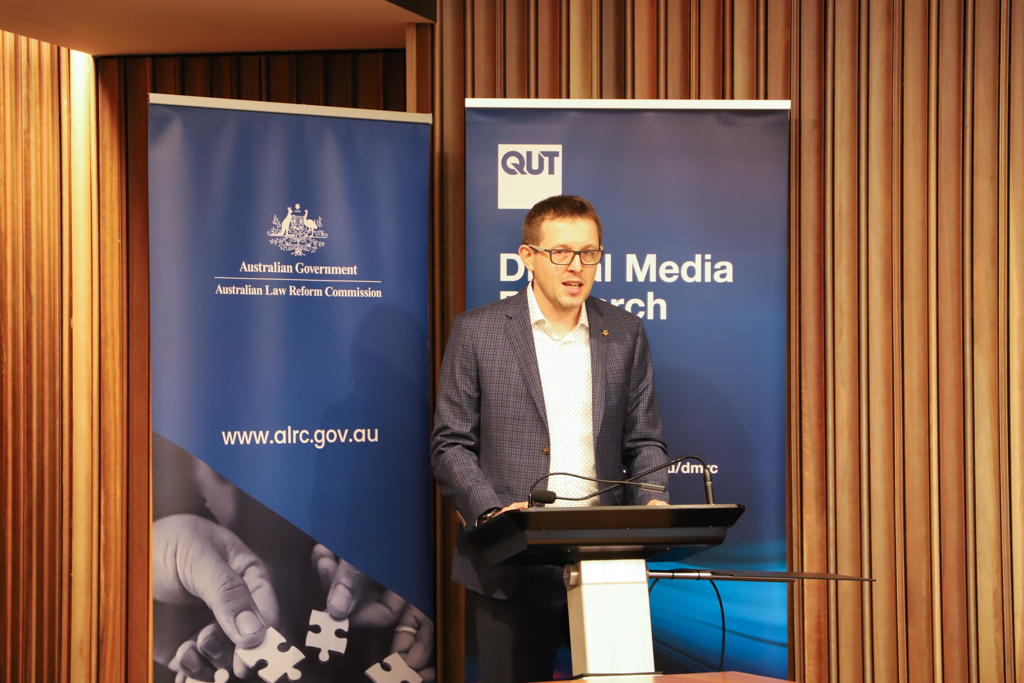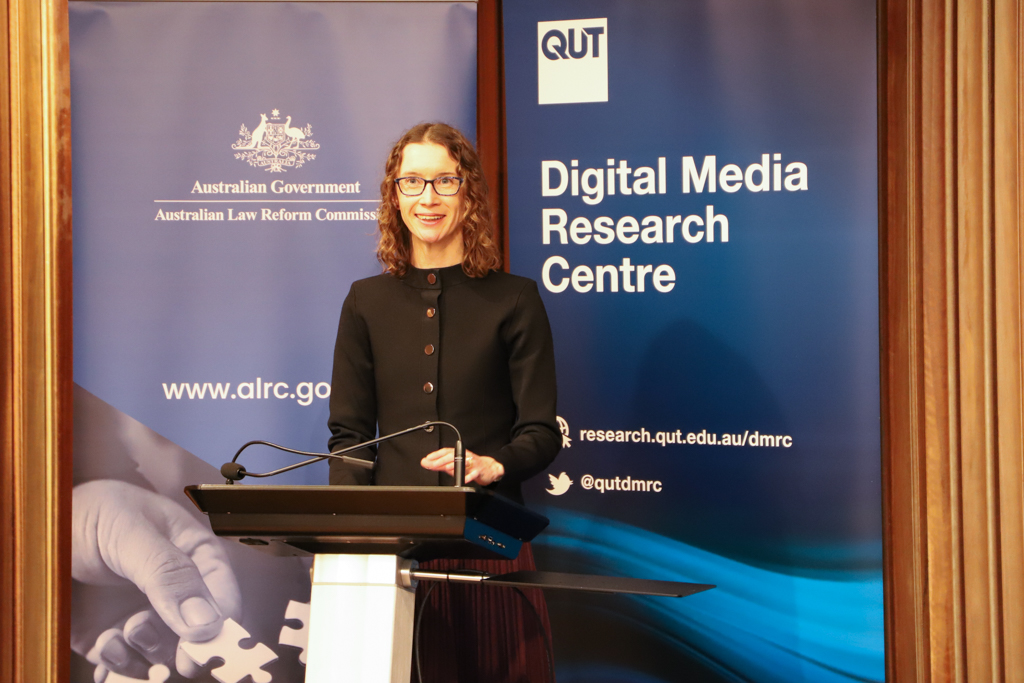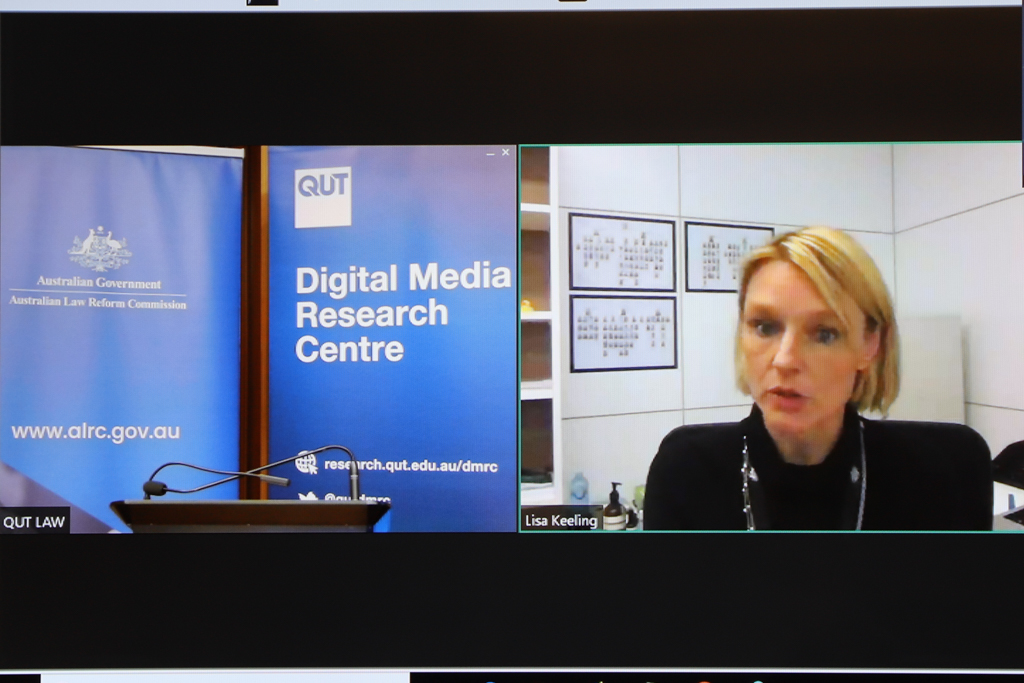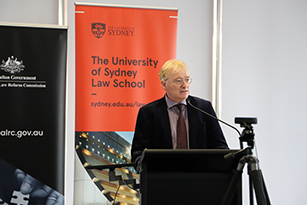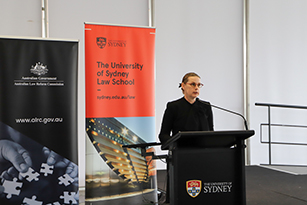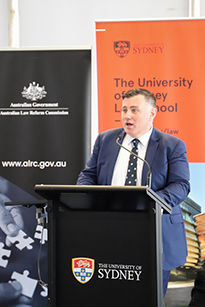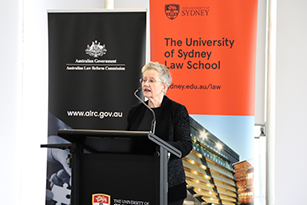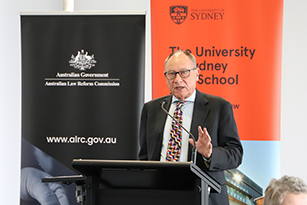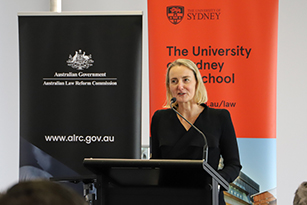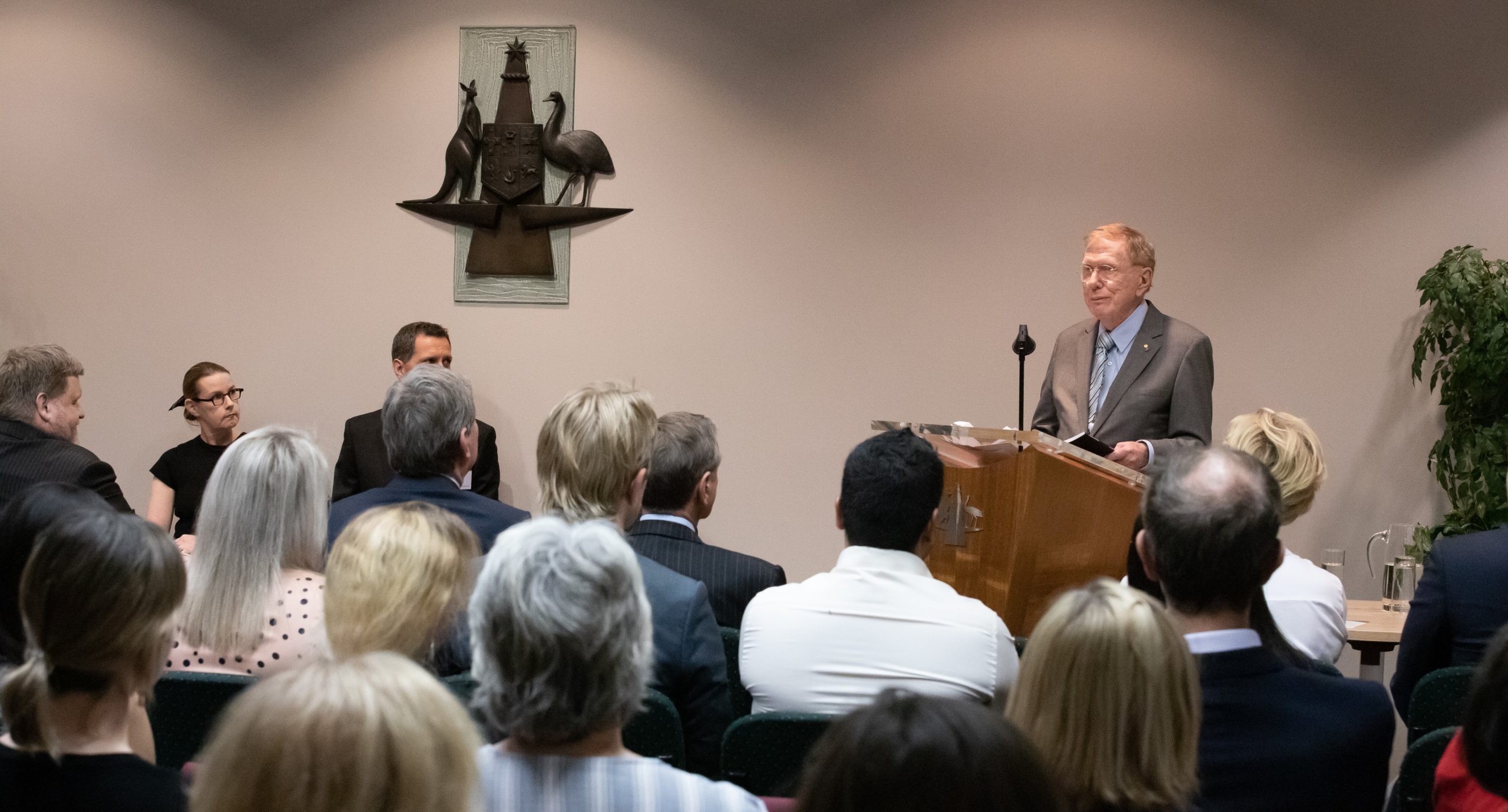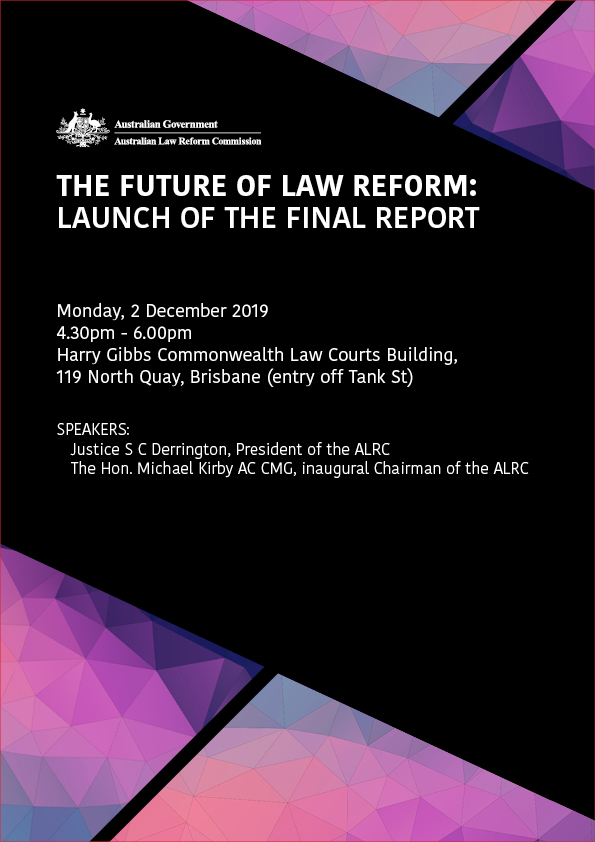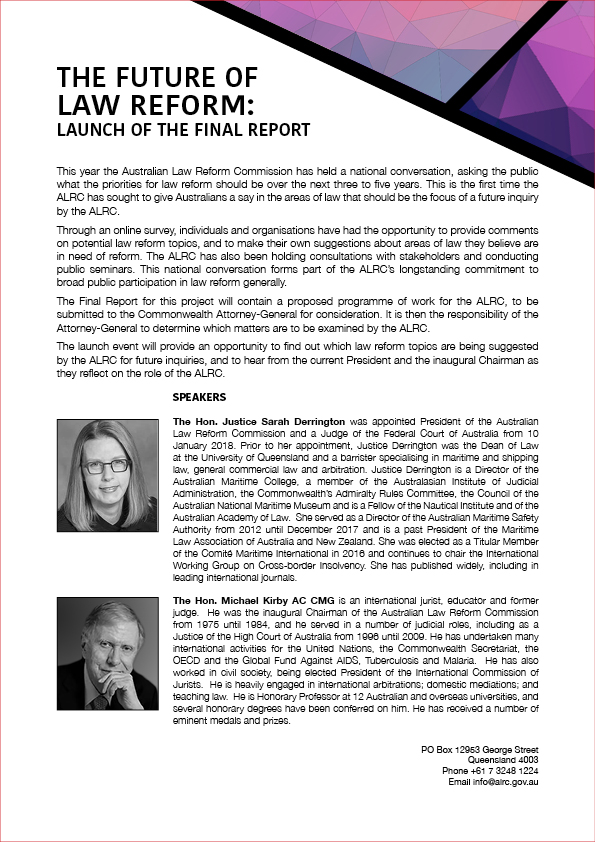The Law Society of Tasmania Law Letter Article by ALRC Principal Legal Officer Micheil Paton
In December 2019 the ALRC released a suggested program of work for the next five years. The topics that the ALRC suggests should be prioritised are: automated decision making and administrative law; principle-based regulation of financial services; defamation; press freedom and public sector whistleblowers; and corporate structures for social enterprises.
On Monday 24 August 2020 the Australian Law Reform Commission co-hosted with the University of Queensland a webinar with a panel of experts discussing the potential for a future ALRC inquiry into press freedom. Wolters Kluwer CCH Learning facilitated the live streaming, enabling a nationwide, interactive conversation. This was the fourth and final webinar in a series examining suggested inquiry topics contained in the ALRC’s “Future of Law Reform” report.
A multiple-choice question posed at the start of proceedings indicated that more or less equal numbers of participants felt that law reform is required in relation to each of: changing understandings of “media”, “the press”, and “journalism”; powers of national security agencies; and the confidentiality of journalists’ sources and data.
Professor Patrick Parkinson AM, Academic Dean and Head of the Law School at the University of Queensland, gave a formal welcome, and observed that the ALRC is well placed to examine the complex issues that arise when considering press freedom in the internet age, and in balancing press freedom with national security requirements.
Justice Sarah Derrington, President of the Australian Law Reform Commission, noted that the webinar would focus on press freedom more than public sector whistleblower protections, although both topics were considered together in the Future of Law Reform report, and both remain areas of active interest for the ALRC.
Professor Peter Greste, speaking on behalf of the Alliance for Journalists’ Freedom, highlighted long-standing concerns the Alliance has held for press freedom in Australia, well before the Australian Federal Police raids in June 2019. He acknowledged that some aspects of government legitimately require secrecy, but also emphasised the importance of media being able to hold government to account. He urged the adoption of a Media Freedom Act to ensure that national security agencies and courts, amongst others, consider the effects of their decisions and actions on press freedom.
Jacinta Carroll, from the Australian National University, strongly supported an ALRC inquiry on this topic. She preferred to speak about the “interplay” of security and press freedom, rather than the “balance”, to emphasise that these matters are dynamic, and also interact with other factors such as politics and international relations. She outlined why security classifications are sometimes necessary, noting that Australia (and other democracies) has had secrecy provisions for decades. She emphasised that a number of scrutiny mechanisms are in place, and posed the key question as how to enable people to raise concerns without compromising security. Media is one way to achieve accountability, however does entail risk, particularly given elements of foreign influence on Australian media, and there is no consensus as to who constitutes “the press”.
Georgia-Kate Schubert, from Australia’s Right to Know coalition, suggested that an inquiry into media freedom would provide the ALRC with “acres of paddock to hoe”. She stressed that the media coalition does not seek a broad immunity for journalists from national security laws, and outlined the main changes sought by the coalition in its submission to the Parliamentary Joint Committee on Intelligence and Security. To date the coalition has focused on Commonwealth laws, but state and territory laws are also relevant, and consistency and harmonisation are important. For example, “shield laws” – to protect journalist sources – have only recently been introduced in South Australia, and are yet to be introduced in Queensland.
Dr Rebecca Ananian-Welsh, from the University of Queensland Law School, focused on the need to “decriminalise legitimate good faith public interest journalism” in Australia. She gave examples of criminal offences that can be used against journalists including “receiving stolen goods” for receiving information regarding potential war crimes, and espionage offences for communicating information about Australia’s international affairs. She discussed the possibility of extending shield laws such that they apply in the context of “search and seizure” during an investigation. She suggested the ALRC would be well placed to weigh up the benefits of wide-ranging amendments to disparate statutes, and/or the possibility of a Media Freedom Act as advocated by Professor Greste.
A number of questions from the participants were put to the panel, and discussion points included:
- the possibility of defining “legitimate public interest good faith journalism”, for example by reference to an appropriate journalistic process;
- whether individual journalists should have greater or different rights than media organisations;
- whether media ownership concentration could be influencing citizens’ rights to receive unbiased information;
- whether threats to press freedom, or the decreasing financial viability of traditional press, is more significant in preventing a more diverse media base in Australia;
- the potential benefits and risks involved in privileging any particular media organisation, whether because that organisation agrees to voluntary ethical standards or otherwise;
- the appropriate onus of proof when the matter to be proved is whether a particular person knew a particular piece of information at a particular time;
- the intersection of issues relating to press freedom and open justice, particularly in the context of closed courts adjudicating national security matters;
- whether it is desirable or likely to reform the Australian Constitution or enact a Bill of Rights incorporating press freedom.
Further comments on the need for an inquiry into this topic and other suggested topics closed on 31 August 2020.
View the recording of the Press Freedom webinar
View the recordings from the webinar series:
On Monday 17 August 2020 the Australian Law Reform Commission co-hosted with the University of Melbourne a webinar with a panel of experts discussing the potential for a future ALRC inquiry into legal structures for social enterprises. Almost 200 people viewed the event “live” and many more have registered to view the recording at a later time. Wolters Kluwer CCH Learning facilitated the live streaming of the event, and so enabled a nationwide, interactive conversation.
Professor Pip Nicholson, Dean of the University of Melbourne Law School, welcomed participants and observed that the Covid-19 pandemic has led many to re-think the distinction between purpose and profit, highlighting the relevance of issues relating to social enterprise.
Justice Sarah Derrington, President of the Australian Law Reform Commission, noted it was almost exactly 50 years since Milton Friedman had published an article declaring that “the social responsibility of business is to increase its profits”, and invited the panel to consider whether our current laws adequately provide for the pursuit of other purposes by social enterprises.
Professor Matthew Harding, Deputy Dean of the University of Melbourne Law School, described issues facing social enterprises as “fertile soil for an ALRC inquiry”. He noted that different issues may face “for profit” businesses wishing to pursue other purposes, and “not for profit” charities seeking to support their activities by running profitable businesses or raising capital. Focusing on the issue of when it is appropriate to restrain an organisation from distributing profits to investors, he highlighted the need to assess policy considerations such as “signalling”, and issues of organisational purpose, which are broader than the issue of corporate structure.
Associate Professor Rosemary Langford, also from Melbourne Law School, noted a number of recent overseas developments in this field that could be assessed in an ALRC inquiry. She described Australian law as being “revitalised” without the need for legislative change, as a wide range of business purposes can be accommodated in a company’s constitution, and can fit within fiduciary understandings of governance and accountability. She suggested that broader issues relating to corporate purpose, such as directors’ duties, standing, and enforcement, could helpfully form part of a deeper review of Australian corporate regulation.
Michael Ryland from the Centre for Social Finance Law observed that there are a number of corporate structures being used by social enterprises in Australia, but none of those structures were designed with social purpose in mind. Accordingly, lawyers have developed “work-arounds” for social enterprises that often require bespoke legal advice. He identified a number of legal questions that an inquiry could tackle, including ways of embedding purpose into a legal structure; risks facing directors when prioritising social purposes; appropriate reporting and licensing requirements; how to evaluate social outcomes; and who (beyond shareholders) should have the right to enforce social purpose undertakings.
Trevor Danos AM, an experienced lawyer and strategic advisor, emphasised that any new legal structure could not hope to resolve all problems experienced by social enterprise. Rather, in his experience, the social enterprise sector would seek to prioritise: the availability of grant funding; requirements for governments to increase procurement from social enterprises; more templates and off-the-shelf tools; a national accreditation and regulation framework; and low-cost professional advice (not just legal advice).
Andrew Davies, CEO of B Lab, described a significant cultural shift in recent years towards “stakeholder capitalism”, modifying the historically dominant focus on return for shareholders. B Lab advocates globally for the creation of benefit corporations as a legal status “to lock in mission and facilitate stakeholder governance practices”. However, B Lab is now not pursuing that kind of reform in Australia due to what it sees as an evolution in the interpretation of directors’ duties, including an increased focus on “non-financial risks” by regulators, investors, and corporations themselves. He suggested a broad inquiry into evolving business models and practices, and the role of corporate constitutions, could help clarify whether existing legal structures are indeed adequate, or whether there is a need for any legal reform.
A number of questions from the participants were put to the panel, and discussion points included:
- the relationship between the social enterprise sector and broader questions of social purpose in business;
- the accessibility of laws regulating social enterprise;
- difficulties incorporating a purpose-oriented organisation, and ways of streamlining the process, including published templates;
- the futility of attempting to fit all social enterprises into a “one size fits all” legal model;
- which regulator would oversee any new social enterprise regime;
- difficulties in defining key concepts such as “public benefit” and “private benefit”;
- the importance of transparency in stating an organisation’s purposes, and then measuring its performance against those purposes;
- the importance and difficulty of interpreting an organisation’s practice, as well as its form, in determining its underlying purposes;
- options regarding appropriate tax treatment of social enterprises;
- whether introducing a benefit corporation model could effectively reinforce a focus on the primacy of shareholder interests; and
- related developments in Social Impact Bonds, Social Benefit Bonds, and the work of the Social Impact Investment Taskforce.
Further comments on the need for an inquiry into this topic and other suggested topics closed on 31 August 2020.
View the recording of the Social Enterprises webinar.
View the recordings from the webinar series:
On Monday 10 August 2020 the Australian Law Reform Commission, co-hosted with the Queensland University of Technology and the ARC Centre of Excellence for Automated Decision-Making and Society, a webinar with a panel of experts discussing the potential for a future ALRC inquiry into automated decision making and administrative law. Over 300 people viewed the event “live” and hundreds more have registered to view the recording at a later time. The live streaming of the webinar, facilitated by Wolters Kluwer CCH Learning, provided the opportunity for a nationwide, interactive conversation, with questions welcomed on registration and taken during the event.
- Webinar panel
- The Hon Justice SC Derrington
A multiple choice poll question posed at the outset revealed that a majority of online participants felt that the “transparency of algorithms used by government” is the most important reason that law reform is needed in this area. Fewer participants felt that “review mechanisms for administrative decisions”, and the “collection and use of personal data by government”, demonstrated the need for law reform.
Interestingly, Professor Dan Hunter of the ARC Centre of Excellence for Automated Decision-Making and Society, indicated that developments in “data-driven machine learning” mean that the data that is used to “train” automated systems has become more important than the algorithms themselves. If the data used is in some way discriminatory, then the automated system will be more likely to make discriminatory decisions. The same developments have also made it more difficult for automated systems to “explain” the decisions they make, presenting significant problems from the perspective of administrative law. Ultimately, he urged us not to judge automated systems by the standard of perfection, but rather in comparison to human decision making systems, which are also not perfect.
Professor Marek Kowalkiewicz of QUT Business School emphasised that “the future is already here”, in that we are all subject to automated decisions by government, often without realising it. He explained that automation can be conceptualised in different “levels” (as it is with different types of automated cars), and suggested that new categories could be created so that we better understand what levels of automation are being used for particular government decisions. He also noted that:
- the scale of decision making enabled by automation means that small errors can have large consequences;
- the speed of automated decision making can lead to bottlenecks and delays at other points of a governmental process; and
- automation can reduce uncertainty in a process, which can have both advantages and disadvantages.
- Professor Dan Hunter
- Professor Marek Kowalkiewicz
Dr Anna Huggins of QUT Law Faculty noted the importance of administrative law in promoting executive accountability and protecting individual rights and interests, and the challenges posed by automation. For example, there are risks that statutory meaning may be lost or distorted during the process of turning legislation into machine-readable code. Law reform could address important questions, such as: Should there be regulatory oversight of “high stakes” automated systems before they are implemented? Should administrative law require human oversight for some types of decisions? How could administrative law ensure that automated decisions can be contested?
Lisa Keeling of Services Australia highlighted the scale of the agency’s operations, including processing many millions of applications each year for government payments. Consequently, government needs to embrace automation from a customer service perspective. Automation can provide greater speed, predictability, and transparency for customers, and may be the most appropriate form of decision making particularly in “simple cases”, rather than “complex cases” (although the distinction may not always be clear cut). Government also needs to engage upfront with the risks of automation to ensure decisions are lawful and there is a natural justice process in place for errors made. Law reform could provide a more principled approach to the question of which legislative provisions should grant some discretion to the decision maker, and which provisions should be more “binary” to enable greater automation.
- Dr Anna Huggins
- Lisa Keeling
A number of questions from the participants were put to the panel, and discussion points included:
- important elements of authorising legislation for automated decision making;
- the role of education in enabling lawyers and judges to understand automated systems better;
- how to identify the responsible entity for “bad” decisions;
- appropriate legal requirements for explanations of decisions, and for audits of algorithms;
- how group-based decisions and systemic issues might be better addressed by administrative law and by courts;
- transparency and independent scrutiny of government’s use of personal data;
- comparisons between the way machine-learning systems vary their behaviour over time, and the way the common law varies over time; and
- the potential value of inquiring into the overall governance system for automated decision making, rather than the detail of individual laws.
Further comments on the need for an inquiry into this topic and other suggested topics closed on 31 August 2020.
View the recording of the Automated Decision Making and Administrative Law webinar.
View the recordings from the webinar series:
On Monday 27 July 2020 the Australian Law Reform Commission co-hosted with the University of Sydney a webinar with a panel of experts discussing the potential for a future ALRC inquiry into reform of defamation law. Over 350 people viewed the event “live” and hundreds more have registered to view the recording at a later time. The live streaming of the webinar, facilitated by Wolters Kluwer CCH Learning, provided the opportunity for a nationwide, interactive conversation, with questions welcomed on registration and taken during the event.
An initial survey of the audience revealed that most participants felt that social media and other emerging ‘publication’ technologies were the main reason that defamation law requires further reform. Just over a quarter of participants suggested that defamation law is in need of a comprehensive overhaul.
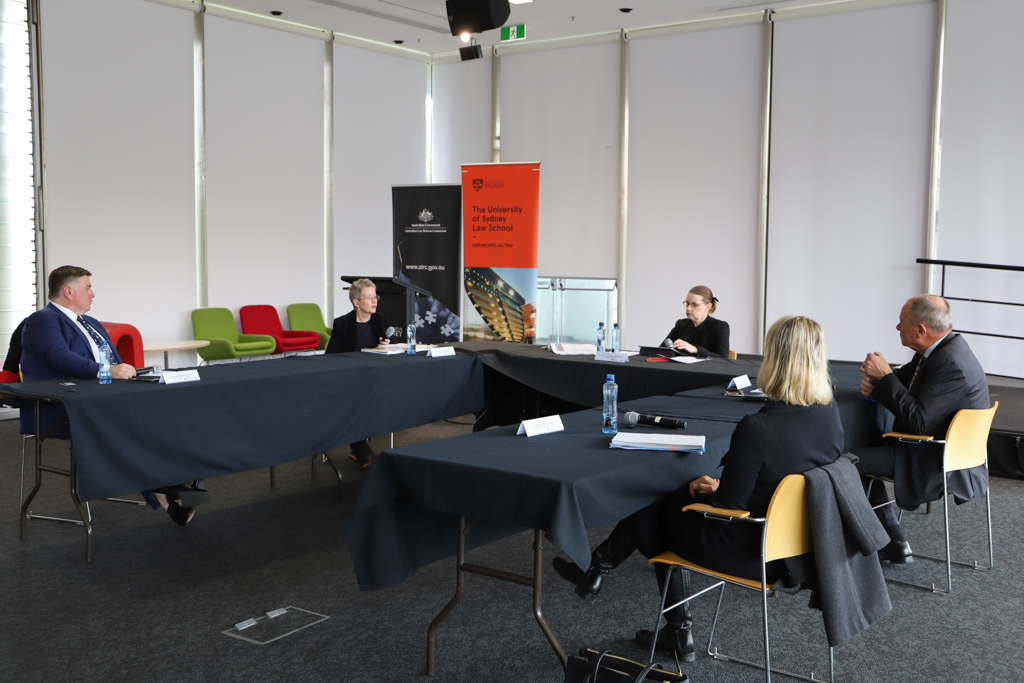
Defamation panel
Professor Simon Bronitt, Dean of Sydney Law School, gave a warm welcome on behalf of the University of Sydney, partially delivered in the local Gadigal language, and acknowledged the importance of updating and reforming the law.
Justice Sarah Derrington, President of the ALRC, emphasised that the event is designed to generate discussion about the need for law reform, and the ALRC does not have set views on how any future inquiry into defamation law should be framed. Consequently, she encouraged all participants to actively contribute ideas.
- Prof Simon Bronitt
- The Hon Justice SC Derrington
Professor David Rolph of Sydney Law School expressed support for an ALRC inquiry, and noted some of the many legal and technological changes that have occurred since the ALRC last reviewed defamation law in the 1970s. In particular, internet technologies have made it easier for private individuals to damage reputations internationally, and have challenged basic concepts of defamation law, such as ‘publication’. In addition, a federal review of defamation law may be beneficial in light of:
- the implied freedom of political communication in the Australian Constitution;
- related provisions in other federal legislation such as the Broadcasting Services Act;
- the increasing defamation caseload in the Federal Court;
- defamation law reform conducted in other jurisdictions.
Judge Judith Gibson of the NSW District Court urged that, to achieve greater consistency, defamation reform should be considered in conjunction with other areas of the law that also face challenges relating to liability for online methods of publication, including copyright, torts, civil content regulation, criminalised speech, and misleading and deceptive conduct. She advocated for an ALRC inquiry to “extend the cyber re-boot of defamation law” envisaged by the Council of Attorneys-General.
- Prof David Rolph
- Judge Judith Gibson
Bruce McClintock SC from the NSW Bar generally concurred, and added that an ALRC inquiry would be beneficial because the Commonwealth has legislative responsibility for the most common methods of communication. He expressed reservations about introducing a public interest defence, and described many cases as illustrating “failures of journalism”, rather than failures of the law.
Georgia-Kate Schubert, representing the Right to Know Coalition, noted that media outlets have sought defamation law reform for a long time, and that public discussions such as this webinar would be a welcome part of any reform process. She agreed that updating the law to reflect technological changes is desirable, but suggested that it may be preferable to observe how the amendments agreed by the Council of Attorneys-General play out before considering any ALRC inquiry into potential further reform.
- Bruce McClintock SC
- Georgia-Kate Schubert
A number of questions from the participants were put to the panel, and discussion points included:
- the current extent of inconsistency in application of the law between states and territories;
- the proper role of pleadings and imputations;
- complexities regarding the application of defences;
- chilling effects on freedom of speech, and on allegations of sexual abuse; and
- reducing the cost, duration, and complexity of proceedings.
The ALRC is accepting further comments on the need for defamation law reform until 31 August 2020, by email to reformpriorities@alrc.gov.au.
View the recording of the Defamation webinar
View the recordings from the webinar series:
What are the most pressing areas for law reform in Australia today?
In 2019, the Australian Law Reform Commission undertook research and broad public consultation to address this question.
Join expert panels including judges, legal scholars and industry leaders in a series of online conversations to unpack some of the key areas identified by the ALRC, including:
- Defamation;
- Automated decision making and administrative law;
- Legal structures for social enterprises; and
- Press freedom.
View the ALRC Report: The Future of Law Reform: A Suggested Program of Work 2020-25
These free, interactive webinars in partnership with Wolters Kluwer CCH Learning will present an opportunity to elicit new perspectives and ideas, enabling individuals with diverse views to contribute to potential law reform.
|
Registrations now closed Webinar recordings available. See links below. |
The Future of Law Reform – Defamation Webinar
![]()
Monday 27 July 2020
1.00pm – 2.00pm
Co-hosted with the University of Sydney

Welcome: Professor Simon Bronitt, Head of School and Dean, The University of Sydney Law School
Panel:
- The Hon Justice SC Derrington, President, Australian Law Reform Commission
- Professor David Rolph, The University of Sydney
- Judge Judith Gibson, District Court of NSW
- Bruce McClintock SC, NSW Bar
- Georgia-Kate Schubert, Australia’s Right to Know coalition.
Automated Decision Making and Administrative Law Webinar
Monday 10 August 2020
1.00pm – 2.00pm
Co-hosted with the Queensland University of Technology Faculty of Law and and the ARC Centre of Excellence for Automated Decision-Making and Society
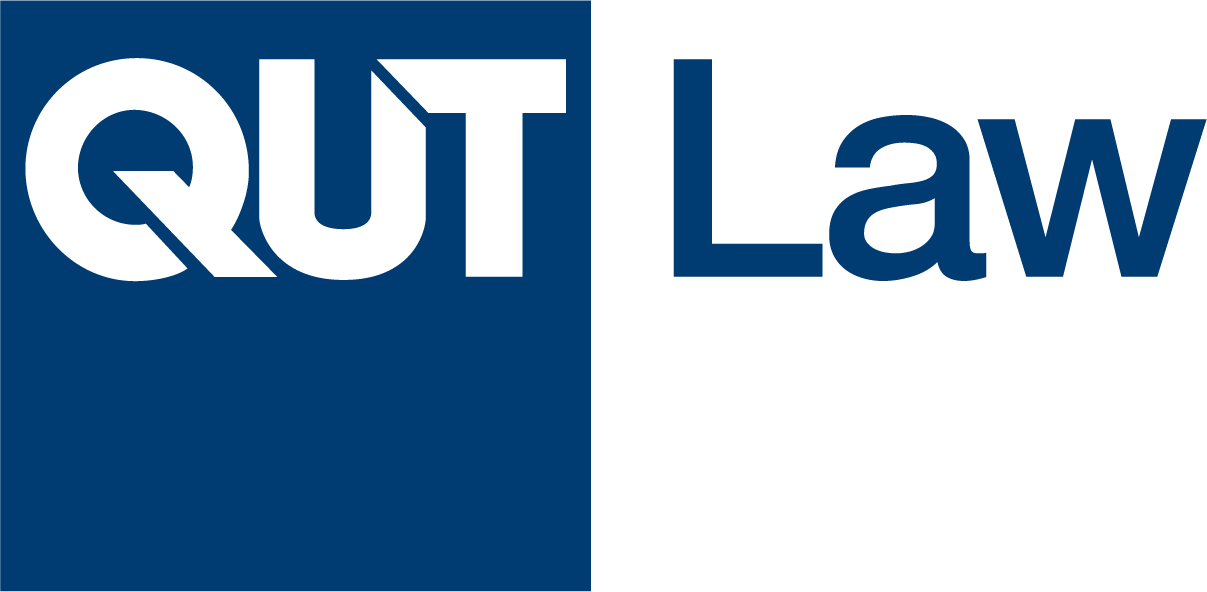
Welcome: Professor Dan Hunter, Executive Dean, Queensland University of Technology (QUT) Law Faculty
Panel:
- The Hon Justice SC Derrington, President, Australian Law Reform Commission
- Professor Dan Hunter, ARC Centre of Excellence for Automated Decision-Making and Society
- Professor Marek Kowalkiewicz, QUT Business School
- Dr Anna Huggins, QUT Law
- Lisa Keeling, Services Australia.
|
View the Automated Decision Making and Administrative Law Webinar |
Reform of Legal Structures for Social Enterprises Webinar
Monday 17 August 2020
1.00pm – 2.00pm
Co-hosted with the University of Melbourne
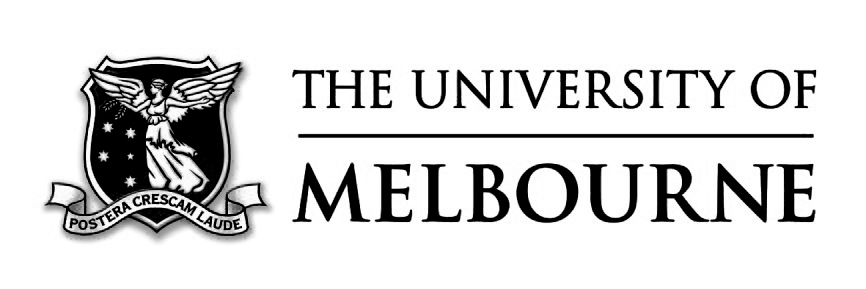
Welcome: Professor Pip Nicholson, Dean of Law, The University of Melbourne Law School
Panel:
- The Hon Justice SC Derrington, President, Australian Law Reform Commission
- Professor Matthew Harding, The University of Melbourne
- Associate Professor Rosemary Langford, The University of Melbourne
- Michael Ryland, Centre for Social Finance Law
- Trevor Danos AM, Advisor
- Andrew Davies, B Lab
Law Reform Relating to Press Freedom Webinar
 Monday 24 August 2020
Monday 24 August 2020
1.00pm – 2.00pm
Co-hosted with the University of Queensland
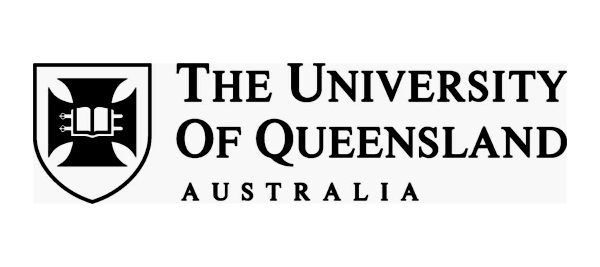
Welcome: Professor Patrick Parkinson AM, Academic Dean and Head of School, TC Beirne School of Law, The University of Queensland
Panel:
- The Hon Justice SC Derrington, President, Australian Law Reform Commission
- Professor Peter Greste, Alliance for Journalists’ Freedom
- Jacinta Carroll, Australian National University
- Georgia-Kate Schubert, Australia’s Right to Know coalition
- Dr Rebecca Ananian-Welsh, The University of Queensland.
Download the ALRC Future of Law Reform Webinar Series Leaflet
On Monday 2 December 2019, the ALRC launched the report of the Future of Law Reform project at a well-attended and high-spirited event in the Commonwealth Law Courts building in Brisbane. President of the ALRC, Justice Sarah Derrington, outlined the origins and purposes of the project, reflecting on the ALRC’s longstanding commitment to public involvement in law reform. Inaugural Chairman of the ALRC, the Hon Michael Kirby AC CMG, spoke about what constitutes an ideal ALRC inquiry topic, and emphasised the need for champions of law reform.
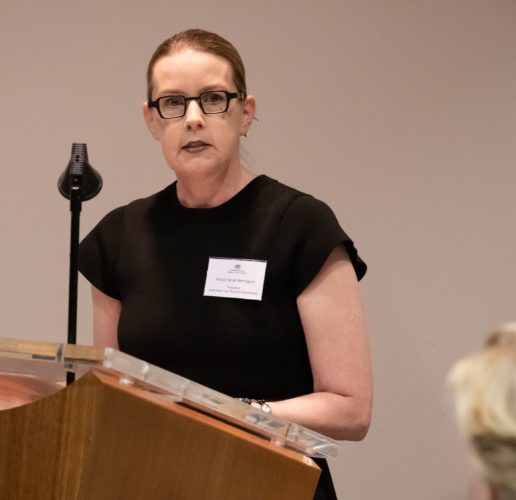
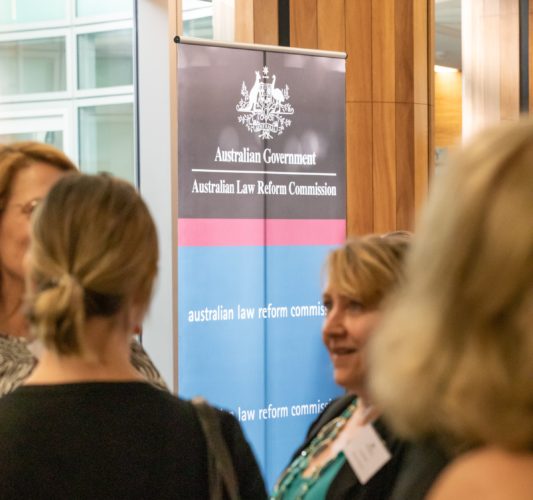
 The Australian Law Reform Commission (ALRC) is today releasing a report suggesting an ambitious agenda for law reform over the next five years. The report will be launched by the current ALRC President, the Hon Justice Sarah Derrington, and the inaugural ALRC Chairman, Hon Michael Kirby AC CMG, in the Commonwealth Law Courts Building in Brisbane.
The Australian Law Reform Commission (ALRC) is today releasing a report suggesting an ambitious agenda for law reform over the next five years. The report will be launched by the current ALRC President, the Hon Justice Sarah Derrington, and the inaugural ALRC Chairman, Hon Michael Kirby AC CMG, in the Commonwealth Law Courts Building in Brisbane.
The report highlights five areas of law suggested for an ALRC review. If accepted by the Attorney-General, the report could map out the work of the ALRC over the next five years.
The five law reform topics identified by the ALRC are:
- principle-based regulation of financial services;
- automated decision making and administrative law;
- defamation;
- press freedom and public sector whistleblowers; and
- legal structures for social enterprises.
The Hayne Royal Commission identified an urgent need to simplify the law in order to regulate more effectively the financial services industry. Legislation needs to identify more clearly the principles underlying specific provisions, to ensure the intent of the law can be understood and followed. An ALRC inquiry could make a significant contribution by demonstrating how this could be achieved in practice. This would build on the ALRC’s current inquiry into Corporate Crime.
Automated decision making is increasingly common in our society, including in government departments. Algorithms and artificial intelligence may present opportunities for more efficient and accurate government decisions, but have also been the subject of controversy. An ALRC inquiry could examine whether the law could better safeguard fair and transparent outcomes.
Defamation laws have struggled to come to terms with modern developments in technology and communications. There is also ongoing debate about the appropriate balance between freedom of expression and the protection of reputation. In recent years, federal courts have increasingly handled defamation disputes, traditionally the work of state courts. By conducting an independent federal defamation inquiry, the ALRC could build on the work of other government-led reviews.
Press freedom and protections for whistleblowers have been hotly debated in recent months. An ALRC inquiry could shed light on whether any changes to the law may be required to appropriately protect press freedom, and whether changes are needed to make laws protecting public sector whistleblowers clearer and more effective.
Social enterprises are organisations that seek to make money, but are also committed to social or environmental goals. It has been suggested that existing legal structures fail to reflect the needs of social enterprises. An ALRC inquiry would examine whether new corporate structures should be introduced.
President of the ALRC, the Hon Justice Sarah Derrington, said, “It is the first time the ALRC has formally sought the views of the Australian public on future inquiry topics. Their input has enriched the process and given a real sense of the legal issues that concern them. We gratefully acknowledge the many individuals who have voluntarily contributed their time and expertise to this project.”
Justice Derrington further noted, “In suggesting these five inquiry topics, the ALRC is not pre-judging the merits of any particular views, but is setting out areas of contention that could benefit from further examination.”
The process of preparing the report has involved extensive research and consultation. The ALRC released two preliminary research papers, held six public seminars and webinars around Australia, conducted an online survey and received over 400 responses, involved law students from two universities in research, and held a number of consultations with stakeholders including government departments.
The report highlights that the best inquiry topics are those that play to the particular strengths of the ALRC, including independence from government, impartiality, legal expertise, and a transparent consultative process.
The full report is available for download.
All media enquiries should be directed to: Matt Corrigan, General Counsel, matt.corrigan@alrc.gov.au, 0427 658 595
In May and June 2019, the ALRC held four seminars on the future of law reform in conjunction with the Law Schools at UNSW, ANU and Melbourne University. To find out more about each seminar you can read a short summary:
On 29 May 2019, the Australian Law Reform Commission and the University of NSW hosted a conversation on the future of law and constitutional reform in Australia. To find out more about the discussion a short summary is available  here.
here.

